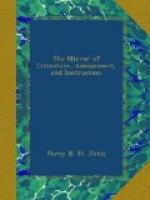* * * * *
THE GATHERER.
* * * * *
Garratt Election.—Proclamation issued by the Mayor of Garratt.—Whereas his Majesty, the King and Queen, is expected to honour this ancient Corporation with his presence, in their tour to Coxheath; in order to prevent his Majesty from no impediment in his journey, the worshipful the Mayor and Bailiff, has thought proper the following regulations should be prohibited as following:—Nobody must not leave no dirt, nor any thing in that shape, before the doors nor shops. And all wheelbarrows, carts, dunghills, oyster-shells, cabbage-stalks, and other four-wheeled carriages, must be swept out of the streets. Any one who shall fail of offending in any article, shall be dealt with according to law.
J. DUNSTAN, Mayor.
Punishment of Death.—The Morning Herald of the 14th states—“We have it on the authority of one who heard the fact from a member of the Privy Council, (at present a Cabinet Minister,) that he frequently saw George the Fourth in a state of extraordinary agitation at the meeting of the Council, when the fate of a criminal was under consideration. He would contend the matter with the ministers and leave the table, and lean sometimes on the chimney-piece, advocating the cause of mercy, until overruled by his responsible advisers.”
Erratum in the Washington “Globe."—For “Bumbleton’s storm destroying porringers,” read “Hamilton’s worm-destroying lozenges.”
Plain Sermons.—Bishop Heber has the following sensible remark in his Journal of Travels:—“I am, on the whole, more and more confirmed in the opinion which Horsley has expressed in one of his Sermons, that a theological argument, clearly stated in terms derived from the English language exclusively, will generally be both intelligible and interesting to the lower classes. They do not want acuteness, or power of attending; it is their vocabulary only which is confined, and if we address them in such words as they understand, we may tell them what truths we please, and reason with them as subtlely as we can.”
Chelsea Heroines.—In the year 1739 was interred in the college burying-ground, Christian Davies, alias Mother Ross, who, according to her own narrative, served in several campaigns under King William and the Duke of Marlborough, and behaved with signal bravery. During the latter part of her life she resided at Chelsea, where her third husband was a pensioner in the college: at this time she subsisted, as she tells us, principally on the benevolence of the quality at court, whither she went twice a-week in a hackney-coach, old age and infirmities having rendered her unable to walk. The famous Hannah Snell, whose history is recorded in various publications of the year 1750, was actually at that time put upon




